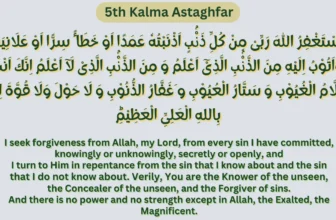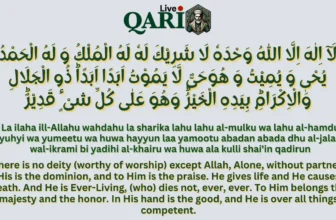
Do you desire a deeper connection to your faith and spiritual fulfillment? The Kalima Tamjeed can be your anchor. Imagine the sense of serenity (peace) as you praise Allah (SWT), remembering that strength and guidance come only from Him.
What is Third Kalima Tamjeed?
The third Kalima, known as Kalima Tamjeed, is a powerful way to praise and glorify Allah (SWT).
“Tamjeed” emphasizes that this Kalima glorifies Allah (SWT) and celebrates His greatness, perfection, and power.
وَلا حَوْلَ وَلا قُوَّةَ إِلا بِاللهِ الْعَلِيِّ الْعَظِيمِ
Understanding the Kalima Tamjeed
Meaning: This verse is a powerful declaration of Allah’s greatness and our complete dependence on Him. It is a reminder to always praise and glorify Allah for His countless blessings.
Meaning: This verse is a powerful declaration of faith and devotion to Allah. Reminds us of the oneness of Allah, His greatness, and our complete dependence on Him.
Meaning: This verse reminds us that we can achieve nothing without His help and that we should always turn to Him for guidance and strength.
Glossary
Dhikr
Hadith
Quran
Subhanallah
Dua
Kalima
Salat
Related Posts
- First Kalima in Islam
- Second Kalma in Islam
- Fourth Kalima Tauheed
- 5th Kalma Astaghfar
- 6th Kalma Radde Kufr
- Techniques for Mastering 6 Kalmas
Why is the Third Kalma Important?
Reciting the Kalima Tamjeed holds immense significance for Muslims:

Strengthening Faith
Guidance and Protection
Seeking Forgiveness
Expressing Gratitude
Join the Online 6 Kalma Course at Qari.Live and Learn from the Best Online Quran Tutors.
Benefits Based on Hadith
Yusuf bin Issa and Mahmoud bin Ghaylan told us on the authority of Al-Fadl bin Musa. He said: Mis’ar told us on the authority of Ibrahim Al-Saskiki on the authority of Ibn Abi Awfa.
He said: A man came to the Prophet, may God bless him and grant him peace, and he said, “I cannot learn anything from the Qur’an, so teach me something that I can say in its place.” He said, “Say, Glory be to God.” Praise be to God, there is no god but God, and God is greatest, and there is no power nor strength except in God, the Most High, the Great.”
Reference: Sunan An-Nasa’i, Hadith 924

Suleiman bin Harb told us, Hammad bin Zaid told us, on the authority of Ayoub, on the authority of Abu Uthman, on the authority of Abu Musa,
He said: We were with the Prophet, may God bless him and grant him peace, on a journey, and when we rose we would say “Allahu Akbar,” and he said: “Follow yourselves, for you will not call a deaf person or an absent person.” You call on the Hearer, the All-Seeing, the Near. Then it came upon me and I was saying to myself: There is no power nor strength except in God. He said to me: O Abdullah bin Qais, say: There is no power nor strength except in God, for it is one of the treasures of Paradise. Or he said: Shall I guide you to it?
Reference: Sahih al-Bukhari, Book 97, Hadith 19
How to Incorporate the Kalima Tamjeed into Your Life?
After Prayers (Salat)
Mindful Reflection
During Difficult Times
Before Sleeping
Throughout the Day

Qari.Live offers comprehensive Online Quran Courses to help you understand the foundation of islmaic values.
Frequently Asked Questions (FAQ’s)
Is there a specific number of times I should recite the third Kalma?
No set number. Consistency, even a few times daily, is key.
Do I need to be pure (wudu) to recite the 3rd Kalma?
Not required, but being in a state of purity enhances the spiritual experience.
When to read the 3rd kalma?
You can recite the third Kalma anytime. Especially beneficial after prayers, before bed, during difficult times, or whenever you feel moved to express gratitude to Allah.
What is the dua of the third kalma tamjeed?
Glory be to Allah, and all praise is due to Allah, and there is no god but Allah, and Allah is the Greatest. And there is no might nor power except by Allah, the Most High, the Most Great.







